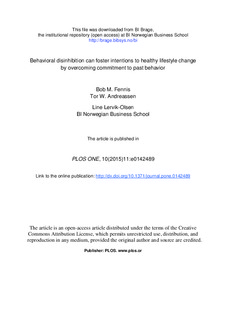| dc.contributor.author | Fennis, Bob M. | |
| dc.contributor.author | Andreassen, Tor W. | |
| dc.contributor.author | Lervik-Olsen, Line | |
| dc.date.accessioned | 2016-01-20T14:13:42Z | |
| dc.date.available | 2016-01-20T14:13:42Z | |
| dc.date.issued | 2015 | |
| dc.identifier.citation | PLoS ONE, 10(2015)11: e0142489 | nb_NO |
| dc.identifier.issn | 1932-6203 | |
| dc.identifier.uri | http://hdl.handle.net/11250/2374393 | |
| dc.description | This is an Open Access journal www.plosone.org | nb_NO |
| dc.description.abstract | To curb the trend towards obesity and unhealthy living, people may need to change their
entire lifestyle to a healthier alternative, something that is frequently perceived to be problematic.
The present research, using a large, representative community sample, hypothesized
and found that a key factor responsible for why people do not intend to change
lifestyles is a sense of commitment to past behavior. However we also found that the contribution
of commitment was attenuated for individuals with a stronger tendency for behavioral
disinhibition thus underscoring the “bright side” of this individual difference characteristic
that traditionally has been mainly associated with impulsive and indulging behavior. Overall,
the present findings add to our understanding of factors inhibiting and promoting healthy
behavior change. | nb_NO |
| dc.language.iso | eng | nb_NO |
| dc.publisher | Public Library of Science | nb_NO |
| dc.title | Behavioral disinhibition can foster intentions to healthy lifestyle change by overcoming commitment to past behavior | nb_NO |
| dc.type | Journal article | nb_NO |
| dc.type | Peer reviewed | nb_NO |
| dc.source.journal | PLoS ONE | nb_NO |
| dc.identifier.doi | http://dx.doi.org/10.1371/journal.pone.0142489 | |
| dc.description.localcode | 1, OA | nb_NO |
